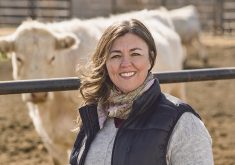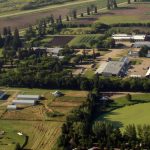Back in the 60s and 70s, loads of North American kids crammed their backpacks to the point of bursting and jumped straight from high school and college into a plane seat for a year of backpacking in Europe or almost anywhere else before settling down.
That was then. Today, though, a lot of those planes are carrying our future farmers overseas. And besides the sightseeing and cultural experiences that they also want, these travellers are on a career mission.
They’ve got a plan. They intend to return loaded with perspectives into farming and food production that they could never get at home. They want a real understanding of where the industry is going, and of what’s possible back on their family farm.
Read Also

How scientists are using DNA and climate data to breed crops of the future
A method for forecasting how crops will perform in different environments so that plant breeders can quickly select the best parents for new, climate-resilient varieties.
Anita Warriner thinks they’re on to something. “There are a lot of great opportunities in the world,” she says.
Warriner is executive director of the non-profit organization, International Rural Exchange Canada (IREC), and she finds more and more parents are agreeing. “They realize they worked really hard for a long time to the exclusion of developing their own lives,” Warriner says. “They don’t want that to happen to their kids.”
Plus, it can be easier to set up the right experience today. “It’s possible to travel on your own or with the support of an organization that knows what challenges you might encounter,” Warriner says. Travel today is a whole different opportunity than the parents of today’s young travellers ever knew.
“One thing we enable through our A-Way to Work program is farm-related travel experiences, which makes travel somewhat familiar, but interesting for people from rural areas,” Warriner says.
IREC connects young people to jobs in agriculture and in food production across Australia, Austria, Denmark, France, Germany, Ireland, Japan, the Netherlands, New Zealand, Sweden, Switzerland and the United Kingdom. And don’t forget the United States.
The organization helps find applicants the best placements that match their interests, it assists with their work visas and it provides ongoing support for the traveller during their stay.
There are other programs offering similar experiences too. In 2019, Amelia Judge decided to head off to Wales with the Junior Farmers Association of Ontario’s (JFAO) exchange program, where she stayed on three dairy farms and joined a regional young farmers group.

“I went partly because I wanted to see another country but also to meet other young farmers my age and see more than a tourist,” Judge says. “You see their everyday life and different events that as a tourist you wouldn’t be able to go see.”
Judge spent five days at the Royal Welsh Show (a major agricultural event) and says she learned a lot about the different regulations that dairy farms have to comply with in the U.K. and the innovations that they have introduced since the elimination of supply management there.
“They think creatively and some have started their own dairy processing, and a lot of them have put in milk vending machines on their farm,” Judge says.
Back in Canada, Nic Willemsma became the community and international program director for JFAO after going to Germany with the exchange program in 2018. The program offers around seven outgoing exchange opportunities a year. Destinations typically include Europe, the United Kingdom and Australia, and there is a bursary to help with the flight costs.
Overseas, delegates are hosted on local farms and they tour different regions to see how agriculture there compares to Canada. Then, in return, JFAO offers incoming exchanges for young overseas farmers to come here.
“The JFAO exchange program is a great option for young people who are looking for a short-term farming experience without necessarily participating in it,” Willemsma says. “Because they are staying with local people, most of their costs are covered so it’s a great way to see another country and its agriculture, and other than flights, there’s not much cost to it.”
Short-term farm stays
Most exchange programs like these are for three to six months, but there is growing interest in shorter-term farm stay experiences. IRE recently launched a new program called FarmStay to help fill the gap for shorter stays when it’s not possible to take extended time away from the farm.
“We set up the FarmStay program for people wanting an authentic way to take in a new culture,” Warriner says. “Participants stay with a host, help out with chores, and experience local culture.”
The IREC FarmStay program is currently centred on people coming to Canada to experience farm life, but the IREC team is working with other partners to develop opportunities for Canadians to do the same in other countries.
“One great option is Ireland, where there are many placements in equine, dairy and general farming,” Warriner says. “When we meet potential new partners around the world at travel conferences or whatever, we get asked about FarmStay a lot, so the concept is coming more into people’s minds.”
Warriner also believes that more young people on farms are being encouraged by their parents to spend some time off the farm.
And if they decide not to return to the farm, or to return but also work off-farm, travelling abroad is a good asset on a resume. Employers look at it as a sign a person isn’t afraid of trying something new, and a good sign they’re able to problem-solve.
In fact, though, those traits also pay off back home. If the traveller comes home to farm full time, they’ll be more capable and more confident, and it will help them get off to a great start.
“Even though people think of (going to other countries) as a pleasure or life experience, it’s also a career move for young people,” Warriner says, adding that there is also a lot of pressure today for kids to leave high school and absolutely know whether they want to farm.
“I think it can be useful for young people to just go and explore, and not feel like they must pick a path immediately after high school,” she says. “If they can self-fund by working somewhere and spend a year overseas, they might realize they like something else or find a career they didn’t even know existed. It can help shape their interests and it’s cheaper than going through a year of school and wasting the tuition money.”
Judge and Willemsma agree that travel gave them opportunities to learn new things and make connections in farming around the world. “I would say take every opportunity available to you… you will always learn something,” Judge says.
“There are many little things that I am sure are going to be useful to me on my own farm,” Judge adds, but then continues, “but maybe the overall thing I learned is that I like how we farm here.”
Where to find the farms?
Organizations including International Rural Exchange Canada (IREC), Junior Farmers of Ontario (for Ontario farmers) and WWOOF (Worldwide Opportunities on Organic Farms) are good places to start for anyone who wants an overseas experience.
Other well-known travel networks providing information about potential hosts both on farms and in other industries include Workaway, Help Exchange and Gapforce. Note that such groups may charge a fee for their service and they don’t necessarily do the matchmaking for you.
Trusted Housesitters is an option for pet lovers who can get free accommodation in exchange for looking after a family pet.
Humanitarian-based volunteer organizations for young people include International Volunteer HQ, Projects Abroad, Kaya Responsible Travel and Worldpackers.
Keep in mind that it’s important to check for reviews of the travel services, the host farms and any businesses.
It’s also possible to find farm stays without going through agencies or organisations by checking job ads online, especially on sites related to agriculture.
“Canadians could look and see if anyone in Europe is advertising for someone to come work there, and they can arrange their work permits themselves,” travel expert Warriner says. “A lot of farms in Canada reach out to find people to come through advertising, and most of them are very good people.”
Amelia Judge also spent five months in Northern Ireland on a dairy and layer farm without going through an exchange organization.
“A farmer had posted a job ad on 519 Farmers — a Facebook group for people in southern Ontario — so I applied and got the job,” she says. “I had to get a U.K. visa but there is a youth mobility visa anyone from 18 to 30 can apply for and it’s all done online, so it’s quite easy.”
What if things go wrong?
What if you arrive at the farm and don’t get on with the hosts or simply don’t like the work they want you to do? Or what if a global pandemic hits when you are away? That’s where going through an organization can be beneficial despite any costs.
“If it doesn’t work, we’ll find you another place,” says International Rural Exchange Canada’s Anita Warriner. “In a time of crisis, it’s great to have someone that has your back and knows what the regulations are because then it’s easier to change your plan or make a new plan. It’s totally possible to go it alone but it depends on the type of person you are.”
At the very least, anyone travelling should look at taking out health and travel insurance that is going to cover any unexpected medical costs they might incur in a foreign country, pay for additional costs for things like accommodation and food, and cover extra fees to get home if they have to stay longer than expected or if flights get cancelled for any reason.
Most countries require people entering to either have travel medical insurance or to pay into the national health system for that country. Some also require personal liability insurance. In addition, it is a good idea to investigate travel insurance to help with unexpected delays or flight cancellations.
“Although it can be tempting to go for the cheapest insurance you can find, it is important to think about the coverage levels,” Warriner says. “Spending an extra few hundred dollars on better coverage can later save you thousands of dollars.”
Regardless of where or how you travel, there is much to be gained from the experience, Warriner adds. “As writer and performer Jaime Lyn Beatty says, ‘Jobs fill your pocket, but adventure fills your soul’.”
Essential documents
If your trip is going to go right, these first stages must go right too.
First, before you go, make sure you set aside enough time to get your documentation in order. It’ll likely take more time than you think.
“When you travel you must follow the laws of the destination country in regard to acquiring a work permit if you intend to work,” warns farm travel expert Anita Warriner.
Short stays of under three months are often considered to be simply for travel and not work but it’s always wise to check the entry requirements of any country you are going to well in advance so you can obtain any documents and vaccinations they may require.
Anyone wanting to travel extensively for longer than three months must prove upon entering the country that they have enough funds to support themselves for the period of time they will be there.
There are various work permits that young Canadians (under 30 except for Australia where the age limit is 35) can get to allow them to work abroad.
The International Experience Canada Work Permits are aimed at young people travelling and experiencing the world. Canada has Youth Mobility Agreements with 32 countries, mostly in Western Europe, Australia, New Zealand, Korea and Japan. These allow a Canadian to go and work there and be paid fair wages, and in return someone from that country could come to Canada and do the same. Working Holiday permits are usually issued for one to two years and are open so that the person can work for anyone in that country.
Not so young?
It’s not just young people who want to travel and have farm stays in other countries. More older people who want to spend their holidays on farms, especially farmers who are now established in their careers and have the next generation taking on more responsibility. That gives them the freedom they didn’t have when they were growing up to step away from the day-to-day of farm life for short periods.
It’s a global trend that Anita Warriner, executive director with non-profit organization International Rural Exchange Canada (IREC), is watching.
She’s also watching a matching trend, with more farms in Canada opening their doors to international travellers looking to experience farm life here.
IREC recently started a new program called FarmStay that offers shorter term farm stays than the traditional youth employment or exchange programs for people under 30.
“Once we started FarmStay, we were getting requests from people in Europe who are 40 and over, wanting to come and spend their month of holidays doing something real,” Warriner says. “They don’t want to be a tourist, they want to know what it’s like to live and work in a place, or it’s always been their dream to drive a tractor.”
IREC FarmStay also includes a network of dozens of hosts in Canada. Hosts are paid a weekly stipend to cover their costs for room and board. More hosts are needed for this growing program—especially hosts with horses or small livestock. Participants are often trying to improve their English, and they love lending a hand to whatever the host might be doing.
















